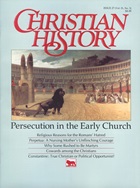Many dates are approximate
Persecution in the Early Church
35 Stephen martyred; Paul converted
42 Apostle James beheaded by Herod Agrippa I
49 Jews expelled from Rome (for disturbances with Christians?)
64 Nero launches persecution
65 Peter and Paul executed
80s Domitian develops emperor worship
95 Domitian executes or exiles several family members on charges of "atheism"
107 Simeon, cousin of Jesus and bishop of Jerusalem, killed for political (anti-Semitic) reasons
110 Ignatius, bishop of Antioch, martyred in Rome
112 Pliny inquires of Trajan how to treat Christians
155 (166?) Polycarp martyred
155, 160 Justin writes First and Second Apology
165 Justin martyred
177 Pogrom in Lyons and Vienne: 48 killed
178 Celsus’s True Discourse against Christians
180 12 from Scilli (N. Africa) killed
197 Tertullian writes his Apology
202 Emperor Septimius Severus forbids conversions to Christianity Judaism)
203 Origen’s father and Perpetua and Felicitas martyred, among others
211–213 North African hostilities
235–36 Emperor Maximin Thrax persecutes church leaders, including Hippolylus
248 Origen writes Against Celsus; persecutions in Alexandna
250 Emperor Decius orders universal sacrifice; church leaders arrested; Origen jailed and tortured; Pope Fabian martyred, as are bishops of Antioch and Jerusalem; Cyprian, bishop of Carthage, and Dionysius, bishop of Alexandria, flee
251 Decius dies; Cyprian returns to Carthage and deals with lapsed Christians; Novationist schism
252–53 Emperor Callus revives persecutions of Decius
254 Origen, weakened from torture, dies
257–60 Emperor Valerian hounds clergy; Cyprian, Pope Sixtus II, and others martyred
261 Emperor Gallienus issues rescript ordering toleration
270s Emperor Aurelian establishes state cult of the Unconquerable Sun (birthday, Dec. 25) and threatens persecution
275 Porphyry writes Against the Christians
298–302 Christians in army forced to resign
303 Great Persecution begins February 23. Four edicts call for church buildings to be destroyed, sacred writings burned, Christians to lose civil rights, clergy to be imprisoned and forced to sacrifice, and (in 304) all people to sacrifice on pain of death
305 Diocletian and Maximian abdicate; hiatus in persecution
306 Constantine named Augustus by troops; in the East, Maximinus II renews persecution (through 310); Council of Elvira, in Spain, passes severe penalties for apostates
311 On death bed, Galerius issues edict of toleration; Maximinus II continues persecution in Egypt; Donatist schism begins
312 Constantine defeats Maxentius to take control of Western Empire
313 Constantine and Licinius meet at Milan; resulting “Edict” of Milan grants toleration of Christianity
324 Constantine defeats Licinius to become sole Roman emperor
Significant Social, Religious, and Political Events
18 Caiaphas becomes high priest
26 Pontius Pilate appointed prefect of Judea
30 Crucifixion of Jesus
39 Herod Antipas dies
43 Rome invades Britain; London founded
46–58 Paul’s missionary journeys
48 Jerusalem Council
64 Great fire in Rome
66 Jewish War begins
70 Jerusalem taken by Romans
74 Masada captured
79 Mt. Vesuvius erupts, destroying Pompeii
95? John exiled to Patmos; Book of Revelation written
101–102, 105–6 The Dacian Wars; Empire reaches greatest extent
132 Second Jewish War led by bar Kokhba (through 135)
140–160 Heretic Marcion and Gnostic teacher Valentinus active
164 Fifteen-year plague breaks out
172 Montanism, an apocalyptic movement later condemned, begins in church
195 Theological writer Tertullian converts to Montanism
212 Roman citizenship extended to every freeborn person
216 Mani, the founder of Manichaeism, a non-Christian sect, born of
230 First Persian War (further wars in 243–44, 254)
232 First known house-churches built
248 Goths attack Rome
259 Shapur I of Persia captures Valerian in battle
268 Goths sack Athens, Corinth, and Sparta
270 Saint Antony, monastic pioneer, seeks solitude in Egyptian desert
285 Roman Empire divided into western and eastern empires
293–303 Emperor Diocletian creates administrative Tetrarchy; reforms army, currency, and taxatation; establishes price controls
311 Eusebius writes Ecclesiastical History
314 Constantine summons Council of Arles to deal with Donatist schism; Lactantius writes On the Death of the Persecutors
318 Arian controversy begins
325 Constantine summons First Council of Nicea to deal with Arian question
328 Athanasius, defender of orthodoxy, elected bishop of Alexandria
330 Constantinople dedicated as Empire’s new seat
337 Constantine baptized shortly before death
Key Roman Emperors
31 B.C.–A.D. 14 Augustus
14–37 Tiberius
41–54 Claudius
54–68 Nero
69–79 Vespasian
81–96 Domitian
98–117 Trajan
117–38 Hadrian
138–61 Antoninus Pius
161–80 Marcus Aurelius
180–92 Commodus
193–211 Septimius Severus
211–17 Caracalla
222–35 Severus Alexander
235–38 Maximin Thrax
249–51 Decius
253–60 Valerian
284–311Tetrarchy
Augusti
Diocletian (284–305)
Maximian (286–305, 307–308)
Caesars
Constatntius I (Aug. 305–306)
Galerius (Aug. 305–311]
284–305 Diocletian
286–305, 307–308 Maximian
305–306 Constantius I
305–311 Galerius
306–312 Maxentius
306–337 Constantine I "the Great"
308–324 Licinius
310–313 Maximinus II Daia
Primary sources for timeline are The Rise of Christianity, by W. H. C. Frend (Philadelphia: Fortress Press, 1984); The Triumph of the Meek by Michael Walsh (London: Roxby, 1986); A History of Christianity, edited by Ray C. Petry (Englewood Cliffs,
Copyright © 1990 by the author or Christianity Today/Christian History magazine.
Click here for reprint information on Christian History.

Support Our Work
Subscribe to CT for less than $4.25/month





























